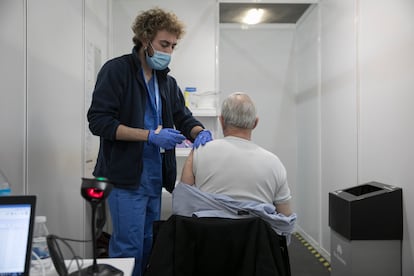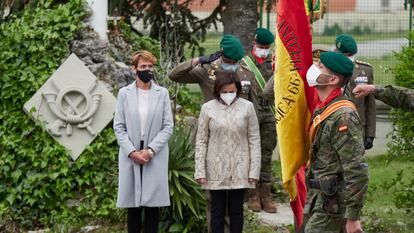Spain meets first Covid-19 vaccination goal: 5 million immunized with both doses
The government has reached its objective for the beginning of May, while the coronavirus incidence rate falls slightly after remaining stable for 14 days

Spain has reached its first Covid-19 vaccination goal: to have five million people vaccinated with the two doses required for full protection by the first week of May.
As of Monday, 5,098,903 people had received two shots of the vaccines made by Moderna, Pfizer-BioNTech and Oxford-AstraZeneca. This is the equivalent of 10.8% of the population. The regions – which are in charge of the vaccination drive as well as containing the pandemic in their territories – have administered 17.1 million doses, 97.3% of the total received.
On April 6, Spanish Prime Minister Pedro Sánchez set down a series of vaccination goals on the way to reaching the final objective of having 70% of the population immunized by the end of August. The government has exceeded the first goal of the schedule: vaccinating five million people with the complete two doses.
The regions have administered 17.1 million doses, 97.3% of the total received
The next goals are to have 10 million vaccinated with the two doses by the first week of June, 15 million by the third week of June and 25 million by the fourth week of July – the equivalent to approximately the entire over-50 population in Spain. It is difficult, however, to make exact calculations based on age groups, given that there is overlap between when the first and second dose is administered and it is not yet known what vaccines will be used for the under-60 population.
Indeed, the Spanish government has not made any more vaccination promises for age groups after it missed its first one by a month. The government had committed to vaccinating 80% of the 80-and-over population in March, but this target was not reached until the end of April. Since then, the vaccination goals have been based on gross population numbers.
The Covid-19 vaccination drive has been racing ahead to meet May’s objective. A new record was set on Friday, when 504,823 shots were administered – the highest number for a single day – and again on the weekend, when 767,000 doses were injected.
After a shaky first three months – which were always going to be slow, but were stalled further by several setbacks – the vaccination drive reached cruising speed in April. More doses were administered in April alone than in the first three months of 2021. And at the current rate, May is on track to also outstrip the first months of the year.

Of the five million people who have received the complete two doses, three million are 70 years old and over. The vaccination drive of the 80-and-over group is nearly complete, with 90% having received both shots. In the 70-79 age group, 79% have been vaccinated with the first dose and 14% with the second.
These age groups are being vaccinated with the Pfizer and Moderna vaccines, as use of the AstraZeneca is restricted to the 60-69 age group. Some in the 70-to-79 population have also received the single-dose vaccine by Janssen, which is made by a unit of Johnson & Johnson. But only 300,000 doses of this medication have so far arrived in Spain. Most of the 60-69 age group is being immunized with the AstraZeneca vaccine, which requires a three-month interval between the first and second shots, meaning it takes a little longer for a patient to receive full protection. As of Monday, more than half of the 60-69 population had received at least one dose of the Covid-19 vaccine.
Next in line for vaccination is the 50-59 age group. It is not yet known what vaccine will be used for this demographic, but it is likely to be Pfizer and Moderna, which are both based on messenger RNA technology. The AstraZeneca vaccine has been ruled out for now for this group, after the European Medicines Agency (EMA) found a “possible link” between the medication and rare cases of blood clots, most of which occurred in people under the age of 60. It is also not known what will happen with Janssen, which was also linked to rate blood clot cases. As this medication only requires one dose, the decision to use it or not in younger age groups will greatly impact the speed of Spain’s vaccination drive.
Coronavirus figures
The vaccination goal was met as the number of coronavirus cases in Spain appears to be falling. According to the latest Health Ministry report, released on Tuesday, the 14-day cumulative number of cases per 100,000 inhabitants has dropped to 223, down from 235 last Monday. For the past two weeks, this data point had been at a plateau of around 230. It is too soon, however, to say whether this is the start of a downward trend or a fall due to underreporting over the weekend. The report also covers Monday which was a public holiday in parts of Spain.
Although the incidence rate is no longer above the 250-threshold considered by the Health Ministry to indicate a situation of “extreme risk,” it is still at the “high-risk” level. Indeed in eight territories, the incidence rate is above the “extreme risk” threshold: Aragón, Cantabria, Catalonia, Madrid, Navarre, Basque Country, La Rioja and the North African exclave city of Melilla. In five regions, the data point is below 100: the Balearic Islands, the Canary Islands, Extremadura, Murcia and Valencia, which is the only region where the 14-day cumulative number of cases per 100,000 inhabitants is below 50. This is the goal the government has set to indicate the pandemic is under control.
The Health Ministry reported 16,353 new coronavirus cases on Tuesday, and added 77 deaths to the official toll, which now stands at 78,293. There are currently 9,747 Covid-19 patients in the hospital and 2,232 in intensive care units (ICUs), which equals an occupation rate of 7.78% and 23.1%, respectively.
Soldier’s death linked to AstraZeneca vaccination

The death of Francisco Pérez, a 35-year-old soldier, has been directly linked to the AstraZeneca vaccine, Defense Minister Margarita Robles announced on Tuesday. A member of a specialized mountain unit in Navarre, he died on April 24 after suffering a blood clot in the brain which led to thrombocytopenia and cerebral hemorrhaging. He had received the Covid-19 vaccine just days earlier on April 17.
English version by Melissa Kitson.
Tu suscripción se está usando en otro dispositivo
¿Quieres añadir otro usuario a tu suscripción?
Si continúas leyendo en este dispositivo, no se podrá leer en el otro.
FlechaTu suscripción se está usando en otro dispositivo y solo puedes acceder a EL PAÍS desde un dispositivo a la vez.
Si quieres compartir tu cuenta, cambia tu suscripción a la modalidad Premium, así podrás añadir otro usuario. Cada uno accederá con su propia cuenta de email, lo que os permitirá personalizar vuestra experiencia en EL PAÍS.
¿Tienes una suscripción de empresa? Accede aquí para contratar más cuentas.
En el caso de no saber quién está usando tu cuenta, te recomendamos cambiar tu contraseña aquí.
Si decides continuar compartiendo tu cuenta, este mensaje se mostrará en tu dispositivo y en el de la otra persona que está usando tu cuenta de forma indefinida, afectando a tu experiencia de lectura. Puedes consultar aquí los términos y condiciones de la suscripción digital.









































